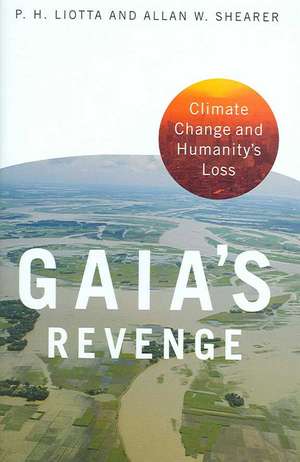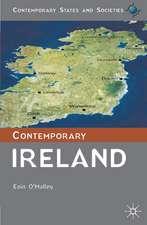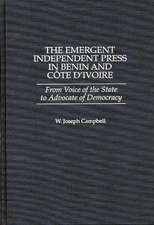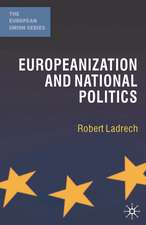Gaia's Revenge: Climate Change and Humanity's Loss
Autor Allan W. Shearer, P. H. Liottaen Limba Engleză Hardback – 29 dec 2006 – vârsta până la 17 ani
Preț: 354.67 lei
Preț vechi: 414.51 lei
-14% Nou
Puncte Express: 532
Preț estimativ în valută:
67.89€ • 73.77$ • 57.06£
67.89€ • 73.77$ • 57.06£
Carte tipărită la comandă
Livrare economică 21 aprilie-05 mai
Preluare comenzi: 021 569.72.76
Specificații
ISBN-13: 9780275987978
ISBN-10: 0275987973
Pagini: 208
Dimensiuni: 156 x 235 x 21 mm
Greutate: 0.46 kg
Editura: Bloomsbury Publishing
Colecția Praeger
Locul publicării:New York, United States
ISBN-10: 0275987973
Pagini: 208
Dimensiuni: 156 x 235 x 21 mm
Greutate: 0.46 kg
Editura: Bloomsbury Publishing
Colecția Praeger
Locul publicării:New York, United States
Notă biografică
P. H. Liotta is Executive Director of the Pell Center for International Relations and Public Policy in Newport, Rhode Island, and Tenured Professor of Humanities at Salve Regina University. As a member of the Intergovernmental Panel on Climate Change, he shares in the 2007 Nobel Peace Prize. He is the author of seventeen books.Allan W. Shearer is Assistant Professor of Landscape Architecture at the School of Environmental and Biological Sciences, Rutgers-The State University of New Jersey. His work focuses on the development and use of scenarios for environmental planning and management decisions.
Recenzii
Liotta and Shearer make compelling cases that offer a broad examination of the meaning of climate change and global warming; within that framework, they maintain a strategic perspective on the implications of environmental effects on security in its broadest sense. Several scenarios are created from the premise above in seven chapters that include rapid climate change; careful examination of security with a focus on the relationship between threats and vulnerabilities; principles behind creating and using scenarios; overview of several methods drawn from the larger literatures of futures and security studies that offer more focused images of the future relative to the context of climate change and societal needs; and finally, a summation that draws all this material together and provides some directions for further thought. This reviewer considers this a factual and unbiased work that reminds us how much remains to be done. Two appendixes explain the abrupt climate change scenario and implications for the US, and a joint science academies statement highlights a global response to climate change. Select bibliography; four-page index. Recommended. Upper-division undergraduates through faculty.
It is broad in scope and original in terms of its content and does not go over the ground that is covered in many recent books on global warming.
Offering a broad examination of the meaning of climate change and global warming while maintaining a strategic perspective on the implications of environmental effects on all forms of security--national, international, and human.
In Greek mythology, Gaia was the goddess of Earth. Her revenge for human accumulation of greenhouse gasses, write the authors, is global warming. How to manage the problem? Liotta and Shearer propose viewing it as a matter of security with climate change perceived as the threat. Environmental degradation, they write, can be a direct threat to health and a contributing factor to conflict; limited natural resources may trigger clashes between of within states The book outlines various scenarios--both grim and hopeful.
Making the short conceptual leap from a vengeful god to a vengeful planet, Liotta and Shearer look at climate change and human impact, and the continuing failure of decision makers engaged in security to deal with global warming effectively. Their topics include an abrupt climate change scenario and its meaning for security, the fear factor, and the end of the anthropocene.
It is broad in scope and original in terms of its content and does not go over the ground that is covered in many recent books on global warming.
Offering a broad examination of the meaning of climate change and global warming while maintaining a strategic perspective on the implications of environmental effects on all forms of security--national, international, and human.
In Greek mythology, Gaia was the goddess of Earth. Her revenge for human accumulation of greenhouse gasses, write the authors, is global warming. How to manage the problem? Liotta and Shearer propose viewing it as a matter of security with climate change perceived as the threat. Environmental degradation, they write, can be a direct threat to health and a contributing factor to conflict; limited natural resources may trigger clashes between of within states The book outlines various scenarios--both grim and hopeful.
Making the short conceptual leap from a vengeful god to a vengeful planet, Liotta and Shearer look at climate change and human impact, and the continuing failure of decision makers engaged in security to deal with global warming effectively. Their topics include an abrupt climate change scenario and its meaning for security, the fear factor, and the end of the anthropocene.













